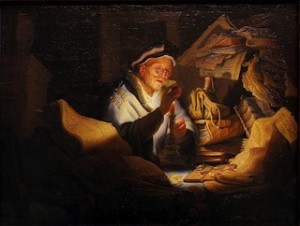Thoughts on Today’s Lessons for Sunday, Aug. 4, 2013.
Psalm: Psalm 107
The Israelites returning from exile might have sung a hymn like Psalm 107, subtitled, “God’s compassion despite Israel’s Ingratitude.” Three times in these few verses the people praise God’s “steadfast love,” a poignant Hebrew word – “chesed” – that may also be translated as “compassion,” “faithfulness,” “kindness,” “mercy” or “grace.” Also, did you notice the phrase, “the hungry [God] fills with good things”? If that seemed familiar, you may be remembering the Magnificat, the song of Mary, who used the same words to thank God for choosing her as the mother of Jesus.
Second Reading: Colossians 3:1-11
Continuing this week in Colossians, a letter perhaps written by a later follower of Paul in his name, we see a variation of Paul’s radically inclusive “Neither Jew nor Greek” phrase in his letter to the Galatians. Once we are “raised” with Jesus and connected with each other in baptism, such earthly differences as race, religion, gender, class and culture no longer matter. Our new life in Christ is one in all.
Gospel: Luke 12:13-21
The rich man in Jesus’ parable became wealthy through his work, planning and careful investment. He has an enviable retirement plan, having stored up sufficient property and earnings to ensure him a merry life of ease in retirement. Yet God calls him a fool! What are we missing here? Perhaps Jesus is making two points: We never know when we’ll die, and the man has saved up for a future he’ll never see. Perhaps even more important, he is greedy. He never gave a thought to others. Jesus, who reminded us that what we do for the poor, we do also for him, has little patience with those who think only of themselves.

